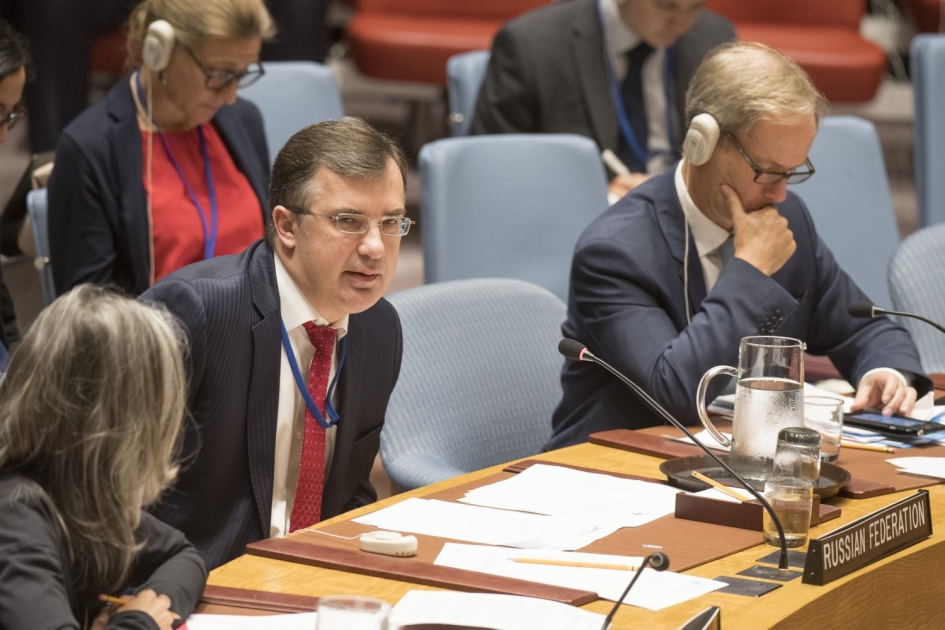Statement by Mr.Gennady Kuzmin, Deputy Permanent Representative of the Russian Federation to the United Nations, at the Security Council on the protection of civilians in armed conflict
We thank the Polish presidency for organizing today’s meeting on the problem of the protection of civilians in armed conflict, a very important issue that we should be addressing.
We would also like to thank Secretary-General António Guterres, Mr. Yves Daccord, Director-General of the International Committee of the Red Cross, and Ms. Hanaa Edwar for their contributions to our discussion. We share the Secretary-General’s desire to see us unite our efforts to prevent conflict and protect civilians.
It is support for the central role played by the United Nations, international law and traditional spiritual and moral values that will enable us to make progress on a unified agenda and overcome our differences. However, to our great regret, today we are seeing an extremely damaging trend towards an unprecedented politicization of the humanitarian arena in international relations.
Despite all our efforts, thousands of civilians continue to die during conflicts. The fact that a large percentage of the victims are women, children and the elderly, medical workers, journalists and humanitarian personnel is especially worrying. These people’s grief instantly becomes a backdrop for political strategy games in which constructive dialogue is subsumed in a flood of unverified news items and primitive judgments. Accusations appear and the guilty are instantly designated. Some do not hesitate to support their accusations with blatant misinformation from dubious sources such as the notorious White Helmets, for example. Hordes of so-called investigators appear from somewhere with vague mandates from various bodies, in most cases conducting their investigations from a distance and on the basis of reports from specially selected mass media and information from the Internet.
It is the rule for such so-called investigators to have their own so-called top-secret informants and sources who under no circumstances can be revealed. We are simply asked to believe them. Unfortunately, these games, which we have frequently been compelled to witness even inside our Organization, contribute nothing to achieving the noble goals of preventing and minimizing the suffering of civilians. Such double standards, alas, have been clearly evident in the information disseminated about the military campaigns in Syria, Iraq, Yemen, Afghanistan and other countries. What is going on right now in Ukraine is particularly painful for us.
We will talk about that in more detail on 29 May, when the Polish presidency is planning a special briefing on Ukraine. But given the topic of today’s debate, I cannot omit to cite the tragic numbers of civilian casualties, which Poland’s Minister for Foreign Affairs has also mentioned. As a result of the armed conflict unleashed by Kyiv against its own population in south-east Ukraine since April 2014, more than 2,500 civilians have perished, 105 of whom died in 2017 and 10 so far this year. As many as 9,000 people have been injured, and hundreds are missing without trace.
There are at least 138 children among the dead, 109 of whom died in Donetsk and Luhansk. The intensity of Kyiv’s shelling of residential areas has noticeably increased lately. A number of Western countries have played a not insignificant part in this through their open connivance in Kyiv’s violations of the Minsk agreements, which are the only legal basis for a settlement of the situation in eastern Ukraine. The activities of humanitarian agencies are an important factor in the protection of civilians. Their work should be founded on the Charter of the United Nations and the basic humanitarian principles and should supplement efforts to political solutions to conflicts.
In that context, two of the fundamental principles at issue are respect for the sovereignty of States and non-interference in their internal affairs. We continue to be seriously concerned about attempts to freely interpret the norms of international humanitarian law with regard to the protection of civilians in armed conflict, as well as their association with all kinds of concepts. Just recently, one delegation on the Security Council pulled the concept of so-called humanitarian intervention out of thin air. A missile attack on the territory of another State was explained by humanitarian considerations, clearly out of concern for those being shelled, of course.
I would therefore like to reaffirm our position that using any means of response with the aim of protecting civilians, particular any means involving the use of force, is possible only if it is sanctioned by the Security Council and is in strict accordance with the provisions of the Charter of the United Nations. If I may, I would also like to comment on what the Polish Foreign Minister said regarding the proposed initiative to voluntarily give up the right of veto in the case of atrocities and the most serious crimes.
As the Council is aware, the institution of the veto is a very important component of the system of checks and balances in the United Nations, and a core element of our mechanism for collective decision-making that encourages Council members to seek compromises. For those who possess it, the permanent members of the Council, having the right of veto is not just a prerogative, it is also a great obligation and responsibility.
The use of the veto has more than once spared the United Nations from an association with dubious ventures that resulted in the suffering of civilians. The world frequently still feels the consequences of such ventures.
